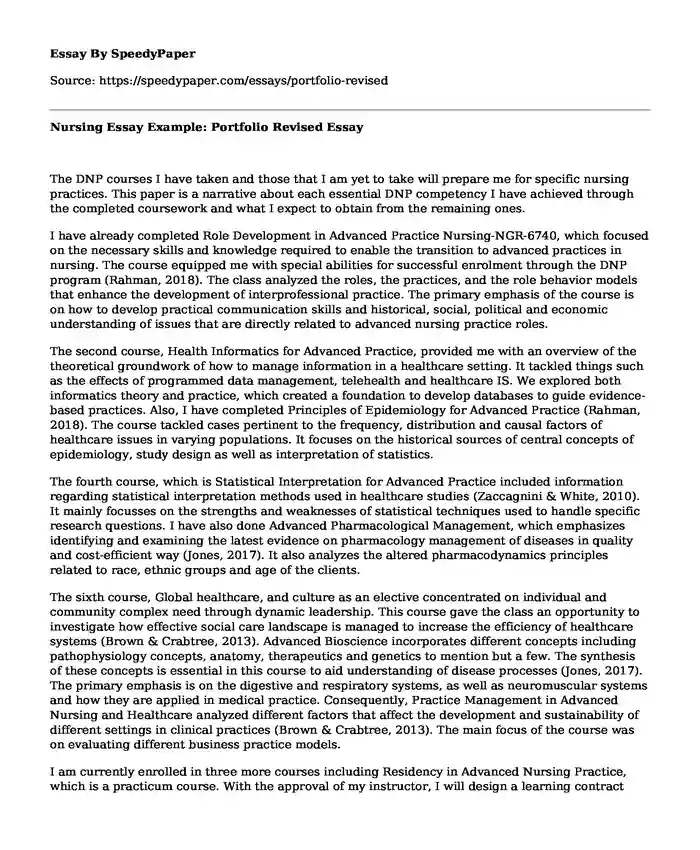The DNP courses I have taken and those that I am yet to take will prepare me for specific nursing practices. This paper is a narrative about each essential DNP competency I have achieved through the completed coursework and what I expect to obtain from the remaining ones.
I have already completed Role Development in Advanced Practice Nursing-NGR-6740, which focused on the necessary skills and knowledge required to enable the transition to advanced practices in nursing. The course equipped me with special abilities for successful enrolment through the DNP program (Rahman, 2018). The class analyzed the roles, the practices, and the role behavior models that enhance the development of interprofessional practice. The primary emphasis of the course is on how to develop practical communication skills and historical, social, political and economic understanding of issues that are directly related to advanced nursing practice roles.
The second course, Health Informatics for Advanced Practice, provided me with an overview of the theoretical groundwork of how to manage information in a healthcare setting. It tackled things such as the effects of programmed data management, telehealth and healthcare IS. We explored both informatics theory and practice, which created a foundation to develop databases to guide evidence-based practices. Also, I have completed Principles of Epidemiology for Advanced Practice (Rahman, 2018). The course tackled cases pertinent to the frequency, distribution and causal factors of healthcare issues in varying populations. It focuses on the historical sources of central concepts of epidemiology, study design as well as interpretation of statistics.
The fourth course, which is Statistical Interpretation for Advanced Practice included information regarding statistical interpretation methods used in healthcare studies (Zaccagnini & White, 2010). It mainly focusses on the strengths and weaknesses of statistical techniques used to handle specific research questions. I have also done Advanced Pharmacological Management, which emphasizes identifying and examining the latest evidence on pharmacology management of diseases in quality and cost-efficient way (Jones, 2017). It also analyzes the altered pharmacodynamics principles related to race, ethnic groups and age of the clients.
The sixth course, Global healthcare, and culture as an elective concentrated on individual and community complex need through dynamic leadership. This course gave the class an opportunity to investigate how effective social care landscape is managed to increase the efficiency of healthcare systems (Brown & Crabtree, 2013). Advanced Bioscience incorporates different concepts including pathophysiology concepts, anatomy, therapeutics and genetics to mention but a few. The synthesis of these concepts is essential in this course to aid understanding of disease processes (Jones, 2017). The primary emphasis is on the digestive and respiratory systems, as well as neuromuscular systems and how they are applied in medical practice. Consequently, Practice Management in Advanced Nursing and Healthcare analyzed different factors that affect the development and sustainability of different settings in clinical practices (Brown & Crabtree, 2013). The main focus of the course was on evaluating different business practice models.
I am currently enrolled in three more courses including Residency in Advanced Nursing Practice, which is a practicum course. With the approval of my instructor, I will design a learning contract detailing the attainment of either a new or a higher level of clinical skill that I did not acquire during my master’s degree. A qualified expert will guide the process of skill acquisition to enhance efficiency (Kathleen, Susan & Scott, 2017). The second course is Public Policy Implications for Advanced Practice, and it deals with the changing models of policies in healthcare. The course will consider where the systems that were created through administrative and legislative action originated from. It will also discuss policy creation strategies, implementation strategies as well as evaluation strategies (Kathleen, Susan & Scott, 2017).
Finally, I am also enrolled in Evidence-Based Practice I, which includes information about the approach implemented in evidence-based practice to improve the quality of care in a specific practice setting. Particular emphasis will be placed on essential appraisals, and scientific evidence analysis to respond to questions related to improving patient outcomes.
References
Brown, M. A., & Crabtree, K. (2013). The development of practice scholarship in DNP programs: A paradigm shift. Journal of Professional Nursing, 29(6), 330-337.
Jones, K. C. (2017). The Influence of Nurse Leader Caring Competency on Staff Nurse Perception, Employee Engagement and the Patient Experience of Care: A DNP Project. Southeastern Louisiana University.
Kathleen, J. S., Susan, J. C., & Scott, L. (2017). ─ イリノイ大学シカゴ校における DNP 養成の実際─ Nurse practitioner transformation to the Doctorate of Nursing Practice: Crossing the boundaries and navigating the process. 看護研究, 50(1), 18-24.
Rahman, I. (2018). A Global Health Immersion Experience to Greece and Its Application to DNP Essentials: A Thematic Analysis.
Zaccagnini, M., & White, K. (2010). The doctor of nursing practice essentials. Jones & Bartlett Publishers.
Cite this page
Nursing Essay Example: Portfolio Revised. (2022, Sep 07). Retrieved from https://speedypaper.com/essays/portfolio-revised
Request Removal
If you are the original author of this essay and no longer wish to have it published on the SpeedyPaper website, please click below to request its removal:
- Using Wikipedia as a Source - Free Essay for Students
- Essay Sample on Change in the Nursing Department
- Essay Example on Human Rights in North Korea
- Free Essay Example: Turkey vs ISIL
- The Role of the School Nurse, Free Essay for Everyone
- Tobacco Talk Essay Sample
- Essay Example. Discussion of the Field Day Flier
Popular categories





